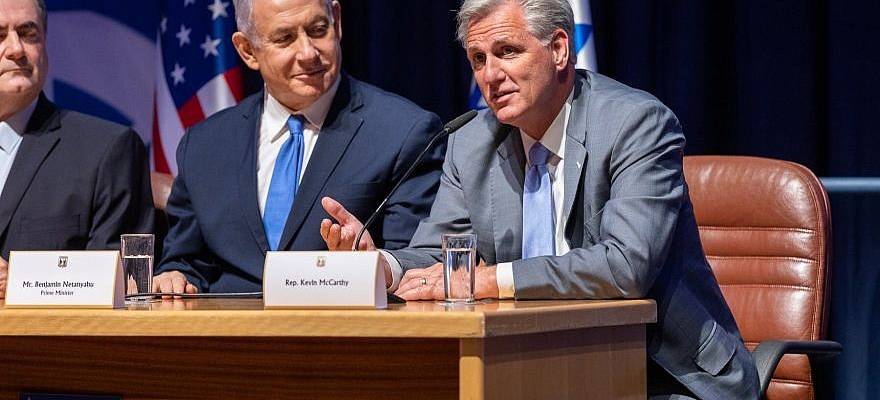“I would not tell Israel, ‘Here is the solution,’ but would rather give Israel whatever it needs for its security,” said House of Representatives Minority Leader Kevin McCarthy (R-Calif.).
By Dov Lipman, JNS
Since the Oslo Peace process, the two-state solution has been viewed by most Democrats and Republicans as the end goal in settling land issues connected to the Israeli-Palestinian conflict. Yet the reality on the ground these past two decades has revealed a corrupt Palestinian leadership, currently headed by Palestinian Authority leader Mahmoud Abbas, that foments ongoing terrorism and incitement as well as Palestinian terror group Hamas controlling Gaza, which has led most Israelis to conclude that two states living side by side in peace is simply not achievable.
U.S. House of Representatives Minority Leader Kevin McCarthy (R-Calif.), who led a delegation of 31 Republicans to Israel this week, echoed such realism, telling JNS that he believes it’s not his job to “pick a solution for the conflict.”
“The world is constantly changing. Look at Lebanon. Look at Syria. Things are always in flux in these areas, so how can we choose a solution now without knowing what’s going to happen in a few years?” he posed.
McCarthy’s comments come amid a larger push to re-evaluate the long-standing policy of a two-state solution. The Trump administration, which has not yet unveiled its own peace plan, has broken with the consensus and so far has not endorsed a two-state solution. This past week also saw 21 right-wing Israeli Knesset members, including two deputy ministers, tell Congress that they view the establishment of a Palestinian state as “far more dangerous to Israel than BDS.”
McCarthy pointed to the 2005 disengagement from Gaza as an example of how solutions that look promising at one moment can turn dangerous very quickly.
“The idea looked good at the time, but then Hamas took over, and now we have missiles falling in Israel,” he said. “I would not tell Israel, ‘Here is the solution,’ but would rather give Israel whatever it needs for its security.”
Other Republicans in the delegation echoed the minority leader’s stance.
Rep. Bryan Steil (R-Wisc.) told JNS that “all we should do is help Israel negotiate from a position of strength.”
Similarly, Rep. Denver Riggleman (R-Va.), who has a background in air-force intelligence, told JNS that “it’s up to Israel and [the Palestinians] to find the solutions to the conflict. The United States must step back and simply support Israel’s right to exist and to secure itself.”
He continued, saying “there is no easy fix” to the Israeli-Palestinian conflict and asked rhetorically, “Who am I to tell Israel what to do?”
Rep. Clay Higgins (R-La.) told JNS that the issues of the conflict run deeper than just borders.
‘I Would Never Suggest Dividing Chicago’
“I would never suggest dividing Chicago to end the troubles stemming from cultural differences and economic disparities in different parts of the city,” he said. “No matter where you draw the map, someone will be ticked off.”
Issues related to the land and the conflict, he said, run deeper than anything that can be solved “in a political solution drawn up in a map room.”
Not all Republican members of the delegation are ready to give up on a two-state solution.
Rep. William Timmons (R-S.C.) told JNS that the situation in Gaza is preventing progress on a two-state solution and not enabling negotiations to move forward.
He explained that while he was disappointed that Abbas did not agree to meet with the Republican delegation, after meeting with P.A. Prime Minister Mohammed Shtayyeh, he supports President’s Trump effort to reach the ultimate deal.
“We are most certainly further away from resolving the conflict than ever before, and there is no trust between the two sides,” said Timmons. “But it is still a worthy effort.”
Similarly, Rep. Ron Estes (R-Kan.) related to JNS that the Palestinian leadership the delegation met with in Ramallah seems to “adamantly want peace,” and he believes that the two-state plan “is the correct one.”
Estes acknowledged that “there are thousands of years of complicated history that needs to be sorted through,” and that it “will take time.”
Growing Disparity Between US Parties
Israel also hosted a Democratic delegation of 41 congressional members, led by U.S. House Majority Leader Steny Hoyer (D-Md.), which arrived on Aug. 9, which overlapped earlier this week for a couple of days with the Republican contingent, bringing near 16 percent of the House together in Israel this summer.
For their part, Democratic lawmakers have been divided on a resolution in the House to reaffirm a two-state solution.
Despite the bipartisan support for Israel expressed by this symbolic act, there does seem to be growing disparity between the parties regarding the best way for the United States to approach the Israeli-Palestinian conflict. While the Democrats staunchly support the two-state solution, it is now clear that many in the Republican Party, including its leadership, are beginning to question the relevance of that plan.
Do You Love Israel? Make a Donation - Show Your Support!
Donate to vital charities that help protect Israeli citizens and inspire millions around the world to support Israel too!
Now more than ever, Israel needs your help to fight and win the war -- including on the battlefield of public opinion.
Antisemitism, anti-Israel bias and boycotts are out of control. Israel's enemies are inciting terror and violence against innocent Israelis and Jews around the world. Help us fight back!



